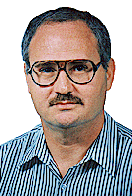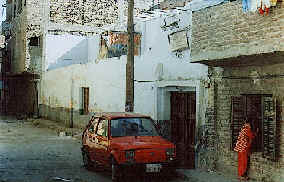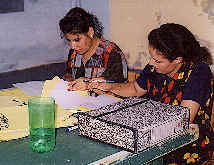| CATHOLICVIEW:
Father Fenech, you
are originally from Malta, in the heart of the Mediterranean. How long have you
served in Egypt and why did you choose Minia?
FATHER FENECH: I
came to Egypt in 1981, as soon as I finished my Theological studies, and after my
Ordination. I was introduced to Minia during my first two years, when I was
studying Arabic. I would travel to Minia on every holiday, to improve and practice
the language. After two years, Minia was my first assignment and I stayed for
3 years, mostly occupied with extra-scholarly activities with adolescents and
youths. After a brief stay of 2 years at our high school in Cairo (College de
la Sainte Famille) I went as parish priest to Armant, a big village near the famous city
of Luxor in Upper Egypt. There
I spent 8 years, getting very involved in, and gaining important experience in Social,
besides Pastoral, work. I
had asked to go to Armant because I had sensed its “missionary” possibilities.
When
the time came for a change,
Minia, our traditional and only Upper Egypt Residence (before Armant), was the obvious
choice. There is a world of difference between Cairo and Minia. And so Minia
once again was my next assignment, where I was told to take charge of our Social Center in
the slum area of Gad-el-Sid.
I
have now been there
for the past 8 years. With the precious aid of many lay co-workers we offer a
wide variety of Social, educational, recreational, cultural and religious activities.
CATHOLICVIEW: The
Residence housing the Jesuit Community, from whom the Gad-el-Sid Social Center depends, is
dedicated to St. Mark who brought Christianity to Egypt. What are some of the
changes that the country has undergone to maintain what St. Mark brought to it and how do
you compare that time with the present day Egypt?
FATHER FENECH: It
is somewhat idealistic to imagine that Egypt became totally Christian with St. Mark’s
Evangelization. Like other countries in the Roman Empire, Christianity gained
control and spread through the land gradually. However by the time of the
arrival of Islam, it seems a considerable part of the country had been
Christianized. As in other countries in the region, Islam took root rapidly,
but only gained majority control over the centuries. The Christians of Egypt, though now a
minority at home, are nevertheless the largest Christian community in the Moslem nations
of the Middle East. The heaviest concentrations are in Middle Egypt, in the
Provinces of Minia and Assiut. The Copts (Coptos, from Aegyptos), the name by
which Egyptian Christians are known, are very proud of their Apostolic origin, St. Mark,
if not actually one of the 12 Apostles, being certainly one of the 4 Evangelists. You can
still sense in the unfolding of the Coptic Rite some of the flavor of the early Christian
liturgies.
CATHOLICVIEW: Father,
the original "go ahead" agreement to open the Center was based on the condition
that any expansion of Jesuits' activities would be in favor of the poor. Is this
still your primary goal today?
FATHER FENECH: Yes,
that is so. People keep suggesting that we open new premises; even if for our school
for example, in more respectable areas. Apart from the fact that we do not have
such plans for the present, we are certainly still very much interested in promoting our
social efforts among the poor. This is in fact not just the present tendency in the
Society of Jesus throughout the world, but actually the Church's own proposal, since
Vatican II, and much more so even today.
CATHOLICVIEW:
Under the trying circumstances of overcrowded conditions and
the poverty you encounter, how do you manage to feed the body, mind and soul of the people
who come to you?
FATHER FENECH: We
all know that it is difficult to feed the soul unless we also feed the
body. So we try to help the whole person: body, mind, soul, etc.
Our activities are varied, covering a wide range of the needs of the ordinary
person, many of which very often are not catered to in our area. It won’t
come as a surprise that in fact many people in our area are on, or below, the poverty line
and some are in actual misery. We
cannot claim to adequately feed all those in need. Our policy is to give
priority to those who come of their own accord and avail themselves of the services at the
Center. I have absolutely no idea where our benefactors have sprang up from,
but we have a certain number, and one can only say that God does not forget His own.
Some friends in Minia itself or in Cairo send us money, clothes (new & used) and even
food and we distribute, starting with the most needy. A number of volunteers
give us their time and energy. We necessarily also have salaried personnel,
for whose salaries we have to solicit funds.
CATHOLICVIEW: It has
been said that Egypt has been the land of tolerance where all people can equally enjoy
their country in peaceful co-existence regardless of race, color or religion. Do you
feel this is a true statement?
FATHER FENECH:
Yes, that statement is generally true. The media is not
always as objective as they claim; much depends on the choice of news items and the words
used. We must remember that ‘humans’ are not that different from one
country to another and such questions as the treatment of minorities exist even in most
‘advanced’ countries, where they are often ignored for obvious reasons.
Also background, history and mentality affect peoples’ attitudes and behavior, and we
must not commit the error that just because others react differently from us, they must be
wrong. If some negative aspects of life are spotlighted in the news, they are
often counter-balanced by more positive benefits, but humans are like that, they decry
injustice but they don’t often speak of the benefits.
All
Eastern - Oriental - Rites, about seven of them if I am not mistaken, both Orthodox and
Catholic, were formerly well represented in Egypt, even in the South. Nowadays
however, they have disappeared from the South and are mostly present in Cairo and
Alexandria. However, very few foreigners of these rites still come to Egypt and the
members of these Churches are now mostly Egyptian. In practice there is peaceful
coexistence of the various denominations.
CATHOLICVIEW: Statistics
show that 85% of Minia’s population represents non-Christian beliefs. What
percentage of the remaining 15% represent Roman Catholicism?
FATHER FENECH: Though
statistics vary according to their origin, the Christians in Egypt represent anything from
5% to 10% depending on who publishes them. It is true though, that in the two Upper
Egypt Provinces of Minia and Assiut, this proportion increases to 15% and maybe
more. It is extremely low in the Delta, for example. The Orthodox Copts are by
far the large majority, and the Orthodox Coptic Church sets the ideal of Christianity in
Egypt generally. The Catholics represent about 150,000 officially, with the
Protestants about the same or slightly more. However, while there are staunch
members for each denomination, many people do not strictly adhere to one or the other
denomination.
CATHOLICVIEW: Father, your
center is located in the heart of the city. What programs and services are offered?
FATHER FENECH: The
Gad-el-Sid Social Center lies in a slum area in the north of Minia City and has been
functioning for the past 35 years. There are no other similar facilities in the
area. Its activities include: After-school evening studies for 110 Primary and
Preparatory public school students; Morning kindergarten (75 children): Summer clubs (150
children average regular attendance); Scouting (average 75 members, all 3 levels) and
Youth groups (about 40 regulars); Mother and child program (40 participants); Lending and
reading library (over 150 regular users); limited Computer facilities; Sewing classes;
Catechism (over 150 regulars); wide range of social work including professional and
material help (over 50 extremely poor families). All activities are open to both
Moslems and Christians (except for religious activities). The premises are old,
insalubrious and small so they have been demolished and are waiting to be rebuilt and
enlarged as soon as possible.
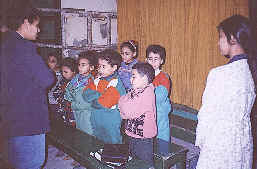
3rd
Primary Catechism class at Gad-el-Sid:
Three classes in one 'big' room
separated by curtain partitions
|
| CATHOLICVIEW: On your
personal website you speak of the social, moral, and psychological problems low income
persons in Gad-el- Sid face in trying to maintain a decent living for their
families. Do you feel these families are more enlightened by the effort of your
Center and its work? |
|
FATHER FENECH: In the
congested area of Gad-el-Sid one finds all the usual physical and moral social problems
typical of such "popular" areas, among others. There are relatively big
families, with an average of 4 or 5 children, in small, congested and insalubrious
housing. There is a lack of environmental and hygienic consciousness in general bad
alimentary habits due to ignorance and often due to lack of financial means. Mothers
have increased responsibility in the care of their children, due to the fact that the
father is either overworked, estranged from the family and/or remarried and living another
life, imprisoned or simply dead. And there is a high level of illiteracy among
parents, mostly of rural origin, especially among mothers. Incomes are low and
insufficient in many households. Low insufficient incomes plaque many
families. Poor attendance in school, desertion and early dropouts remain an ever
present condition, and in certain cases the children must be able to work to help raise
the family's income. There is also a generally large percentage of illiteracy among
those who leave school. A chronic shortage of employment opportunities ranks high,
and the unemployment rate among youth is severe even for those with college degrees.
And so, there is an accumulation
of financial debt due to pressure to pay rent, electricity, water and other bills, usually
because of the absence of a fixed and/or regular job. Added to that is the fact that
there are no local recreational or cultural facilities. Our
Center is just a humble effort trying to do its part.
Our
records contain over 800 file-entries of children who have at some time in the past five
years attended some activity at our Center. However we do try to encourage the very
poor, as we get to know them, to avail themselves of our services. We hope they have
certainly left the Center much more ‘enlightened’ than what they would have been
had they not come. The
testimony of many former patrons who still drop in to say ‘hello’ attests to
this. Our recent and renewed efforts are also producing very tangible results.
Our mission is to try to offer programs for the integral development of
the personality through a wide range of attractive and useful cultural, social and
recreational activities. Hopefully, the children who attend our Center will be
better equipped than their parents to face their future.
CATHOLICVIEW: Who are the key people
involved in maintaining the Center?
FATHER FENECH: Scouting and Catechism are run by volunteers (about 4 for each of
the 3 levels for scouting and about 15 for catechism), and there are about 4 volunteers
who help with evening studies, and in summer with the clubs. Sewing and
Computer classes are also offered by volunteers (1 or 2 in each). We also have
occasional voluntary help with the Social Work (about 3). We have salaried
personnel for all the rest, some on a part-time basis, because many people just can’t
afford the luxury of doing voluntary work: they need to eat. It must however
be kept in mind that salaries here are small (we cannot differ from the average rate), and
our personnel put in much more energy than the value of their salaries. (Salaried
personnel: Kindergarten: 7; Evening studies including lending library:
15 and about 10 in the Summer Clubs; Mother-&-Child: 3; Social workers: 2).
The bulk of the work effort at the Center is done by lay people, both previous
patrons and ‘new’ arrivals, both volunteers and salaried persons.
Yes, the task is great, and we are just a drop in the ocean. But those
involved in the activities are
mostly quite motivated and selfless in effort. Our
mission is to try to offer programs for the integral development of the personality
through a wide range of attractive and useful cultural, social and recreational
activities. Hopefully, the children who attend our Center will be better
equipped than their parents to face their future.
CATHOLICVIEW: How is the
Center funded?
The
“Jesuits’ & Brothers’ Association for Development” (registered
with the Ministry of Social Affairs, no. 352, for 1966) solicits
funding from various benefactors and Associations. It
is difficult to give exact numbers.
CATHOLICVIEW: You have
stated that at the Jesuit Community each priest has a number of responsibilities.
Besides the Gad-el-Center, you have at the "Residence" a School, a Youth House,
the Association and the Church, in addition to the outpost ministries in the villages, all
with various activites of their own. Who handles the needs of the parish?
FATHER FENECH: Our
Mass at the parish is looked after by a diocesan priest, usually in the mornings.
They are part of our ministries with each one of us priests having his own schedule.
The Center is a joint effort with myself, lay people, and volunteers all
working together toward a common goal.
| CATHOLICVIEW: Since
many of the children who attend your Center have no religious affiliations, what can you
offer to the ones who are needful of religious education? |
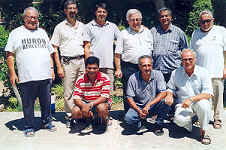
Upper Egypt Jesuit Communities of
Minia and Armant:Back (L to R ): Mounir-Khouzam
(Eg), Radi-Mounir (Eg), Ziad Hilal (Syr),Joe Mizzi (Mal), Magdi-Seif (Eg), Jean Faure
(Fr).
Front (L to R): Bimal
Kerketta (Ind), Atef-Sobhi (Eg), Twanny Fenech (Mal).
|
FATHER FENECH: Our
‘Spiritual/Religious’ service is offered both directly and
indirectly. In Scouting we have a time for prayer, and we try to instill
important Christian values, and we have various Masses organized for youths and others at
the Residence. The children have no affiliations because they just don’t go
anywhere, and often because they get bored during the traditional and rather long
liturgical services. They have absolutely no problem in participating in what
we offer them, and in fact, as we try to reach their inner longings, they tend to respond
very positively when we propose prayers and Mass for them, tailored to their
needs. We also have regular catechism, and while some come expressly for
religious instruction, others are attracted by the games we have just before classes, and
then of course they stay on and enjoy themselves, so they keep coming.
| CATHOLICVIEW: You
speak of discreet and Christian values which you admirably give to those attending the
Center. How effective has this been and have you ever run into trouble doing so? |
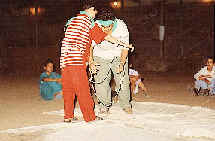
End
of the day group talent show: songs,
plays, games, and many good laughs ...
|
FATHER FENECH: Sometimes
Christians themselves need to be Christianized
and to be trained in Christian values. However we believe that Christian
values are really human values. When we show dedication and gratuity in
service, care and love and appreciation of persons, conscientiousness and rectitude in
work, attention to the needs of the poor and so on, people are very sensitive to it,
irrespective of their religious affiliation. A practical testimony to this is
the number of times that people come to offer voluntary service ‘ because we received
freely’. Other testimonies can be found in the way older patrons are
attached to the place, feel more free ‘to be themselves’ with us, and feel it is
home for them, or when our youths speak and act with greater respect, using much less
crude language than their peers. Our people are not all saints, but mostly
you can tell the difference.
CATHOLICVIEW: Are you ever fearful that the other religious affiliations will be unhappy
with your presence involving their members?
FATHER FENECH: This
may happen sometimes, but ultimately, it’s the response that will tell us whether to
continue or not, and the response is generally positive.
People are after all free to go where they like.
Moreover, our Center does not propose an alternative way of worship, which would be
the case if we were a ‘church’.
The
Center is not a church, and the services and activities that we propose to everyone are
non-religious. In this environment there is absolutely no problem between
Christians and Moslems. Of course, the Moslems at the Center know quite well
who I am, and they all actually call me ‘father’ and they are not embarrassed at
all. If I have to speak on Christian matters, then
almost certainly it will be to a Christian audience. As a policy, even in
teaching Catholic Doctrine, I will still point out any differences that might exist
between the churches, as a matter of respect and sincerity. However you must
not think that Christians in Egypt live in the Catacombs! I have many times
been surprised with the ease with which Christians can speak freely about Christian
religious matters even in front of non-Christians. Without trying to deny that
there may be certain difficulties, yet in everyday life, the good Egyptian people are
generally much more tolerant than what we may be led to believe.
CATHOLICVIEW: Father,
one has to be impressed with all you do in showing God's love without causing religious
problems for other churches. How do you manage such a miracle?
FATHER FENECH: God
does all the miracles. Of course we try to be as respectful of others as
possible. The other denominations know very well who we are and what we say though
officially they have to further their own cause.
CATHOLICVIEW: Father
Anthony Fenech, I know God is well pleased with the Christian attitude you have presented
to the people of Egypt. You have exhibited, by your actions, the face of Christ.
To be able to show God's love to people in all walks of life is an example all of
us should emulate. What you are offering at the Center constitutes a 24 hour day of
showing the grace and love of God to people who would be bereft without the help and
understanding you offer so freely. Thank you very much for this special insight into
your life as a Jesuit priest in Egypt.
FATHER FENECH: Thank
you.

Use
this Comments/Mailing List link
to send your comments or
to be added to the mailing list. God bless you always!

|
